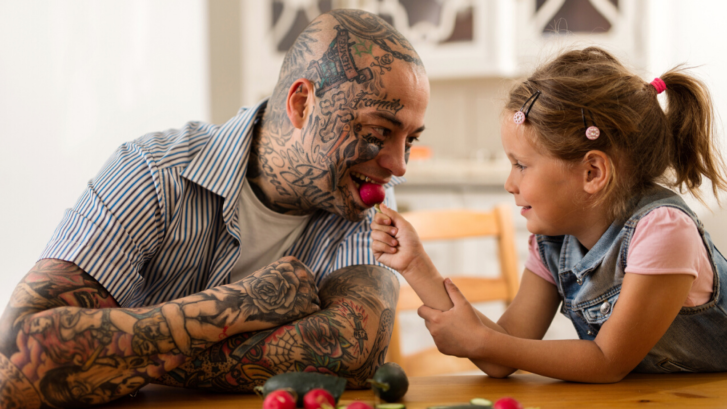Tattoo Health and You: Pro-activity and Risk Prevention
Tattoo artistry has existed and has been culturally-relevant for centuries – from hand-carved and colorful Tebori tattoos that have been applied for over two millennia in Japan, to traditional poke–and-stitch tattoos that have been rites of passage for Inuit women for hundreds of years, tattoos are a body modification that is here to stay.
Tattoos are becoming more commonly found and accepted in workplaces and other public spaces. As they become more mainstream, concern for their health effects has also become a hot topic of conversation.
What are the risks of getting tattooed?
As with any medical or cosmetic procedure, there are risks that come with getting tattoos. The Mayo Clinic notes that because tattoos “breach the skin… skin infections and other complications are possible.” Complications can include:
- Allergic reactions (especially to red, green, yellow, and blue dyes), which can occur immediately after receiving the tattoo, or years later in more rare and serious cases like this one.
- Skin infections, which according to CNN health, can include “pimple-like bumps, blisters, and raised, scaly patches that flake off.”
- Other skin problems such as keloids, which are raised areas of scar tissue that are permanent and hard to treat.
- Blood-borne diseases from potentially non-sterile equipment (including HIV and hepatitis).
- In more rare cases, complications such as:
- MRI complications (some pigments contain metal that may react to the magnetic forces of an MRI, and cause irritation or inflammation)
- Swollen Lymph nodes (from infection or the introduction of foreign matter under the skin)
- Neurodermatitis, or lichen simplex chronicus (this is a skin condition that starts with an itchy patch of skin, that becomes itchier when scratched; this itch-scratch cycle causes the affected skin to become thick and leathery)
How can I safely get a tattoo?
Because tattoo ink has yet to be regulated and approved by the FDA, there will always be some risk associated with getting tattooed. By becoming more informed about how tattoos can be more safely administered, as well as being well-versed and prepared to follow your artist’s aftercare instructions, you can ensure that you will have a much safer and less painful experience.
Here are some ways you can be pro-active about avoiding unnecessary infections and other complications:
- Tattoo artists will typically apply a healing-balm or ointment over a fresh tattoo, along with plastic wrap or other kind of bandage – be sure to leave this on for exactly as long as your artist asks. Depending on the location and the size of your tattoo, some artists will recommend you only leave it covered for an hour, while others may recommend that you leave it wrapped overnight.
- Wash your new tattoo at least twice a day. Be sure to clean your hands before gently washing a tattoo that is healing and always use antimicrobial and scent-free soap to clean it. Pat it – don’t rub it – dry with a clean cloth or soft towel.
- If you’re using an antibiotic ointment, apply a very thin layer and leave your tattoo open to breathe. After a day or two, you can stop using antibiotic ointment, and will need to apply a scent-free moisturizer instead. It is usually recommended that you continue this step for several weeks.
- Avoid swimming or immersing your new tattoo in water for at least two weeks.
- To avoid scarring and to preserve the integrity of your new ink, do not pick or scratch at your new tattoo. Let any scabs or dry skin flakes fall off naturally.
- Wear loose, protective clothing to help keep your tattoo out of the sun for at least three weeks. During this time, do not use sunblock over your healing tattoo.
After getting a tattoo, your skin may appear reddish or feel slightly warm, and it is also normal for your skin to release and ooze any excess ink in the form of a plasma-like substance. While this is normal for the first few days, if you see any kind of skin reaction any time after the initial healing period, you should call your tattoo artist and visit a dermatologist or seek other medical care immediately.
To minimize the risk of complications, be sure to only accept tattoos from parlors and artists who are licensed and trained in tattooing and proper sanitation. Any well-established and reputable tattoo shop or artist should have their licenses displayed in plain view, and will utilize practices that ensure that you are being tattooed with new, clean, and sanitized/sterilized equipment.
Some good indicators that your tattoo artist is following correct procedures are that they replace their gloves and wash their hands periodically, use new razors and needles that have been opened right in front of you, and pour out fresh ink into containers that are separate from each main ink bottle. The most obvious sign of a reputable shop, is a clean and sterile shop.
Contact Healthpointe Today!
While there are many health complications that can arise from receiving body modifications such as tattoos, Healthpointe offers even more solutions!
We offer comprehensive evaluations and treatments for a wide variety of medical needs, and make it our mission to improve every patient’s health to the highest potential, one day at a time.
To learn more about Healthpointe or to make an appointment, contact us at (888) 824-5580 or visit www.healthpointe.net.
Medically reviewed by Dr. Roman Shulze.

